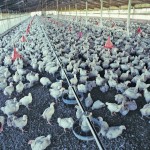
Tag Archives Antibiotic resistance

G7 told to act on antibiotics as dreaded superbug hits U.S.
The U.S. has recorded its first case of resistance to last-resort drug, but it has already surfaced in Canada and Europe

Antimicrobial use in beef to meet new pressures
Antimicrobial resistance in the Canadian beef sector is currently low, but experts warn that producers should be cautious of overuse

U.K. review calls for urgent cuts to antibiotic use in livestock

Antimicrobial resistance in cattle means big changes coming
An alarming rise in resistance even has drug companies calling for producers to change their ways

Women’s Institute calls for action to protect antibiotics from overuse
The Manitoba Women’s Institute held its annual meeting earlier this month in Winnipeg

Auditor general slams federal inaction on antimicrobial drugs for livestock
Little progress has been made after more than a decade of discussions

Hog farmers more likely to carry resistant bacteria, U.S. study shows

Federal government unveils plans to tackle drug resistance
Federal Health Minister Rona Ambrose has held a workshop with industry to discuss the plan

U.S. meat industry bought more human antibiotics to 2013, FDA says

Livestock producers must end antimicrobial growth promotants
The risk from antimicrobial-resistant organisms found in meat is statistically low, but of great potential consequence




